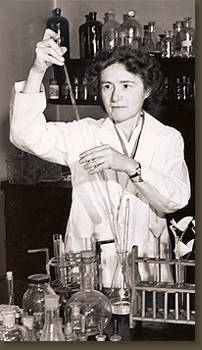

 | | 
|
|---|
 | The implications for the work of Gerty and Carl Cori on
carbohydrate metabolism are so well known in our culture that any normal jock
can tell you the importance of carbohydrates in the generation of energy in the
mammalian body. The names Gerty and Carl Cori and the term Glucose-1-Phosphate
also known as the
Cori ester
mean nothing to the average American. However, most of them know that if
they
consume excess carbohydrate they are likely to become obese.
Gerty Theresa Radnitz and Carl Ferdinand Cori were both born in Prague in what is now the Czech Republic in 1896. They met at the German University of Prague where both studied Medicine. They collaborated on research work as students and spent recreational time together as well. Carl described her as follows: "She was a fellow student, a young woman who had charm, vitality, intelligence, a sense of humor, and love of the outdoors, qualities which immediately attracted me." They married in 1920 after graduating earlier that year with Doctorates in Medicine. |
In the early 1920's Gerty began doing biochemical research in Vienna. Her initial research dealt with thyroid treatment for temperature regulation in a patient with congenital myxedema, and subsequently with studies in thyroid ectomized rabbits. In the time period immediately followed WW I, there was wide spread poverty in this part of Europe and anti-Semitism was emerging as a serious issue for them. Since Gerty was Jewish, this meant that her chances of getting an academic position in Europe were extremely slim. They made a decision to emigrate to the United States in 1922. Their first positions were in what is now Roswell Park, New York, near Buffalo, where Gerty continued her studies of thyroid hormone action. This work quickly led to studies on carbohydrate metabolism in vivo and its hormonal regulation.
In 1931 Carl was appointed Professor and Chairman of the Department of Pharmacology at Washington University Medical School in St. Louis and Gerty accepted a position as Research Associate in that Department at a token salary. Together they established a large and unusually productive research program focusing on blood glucose regulation. This research was recognized by the Nobel Prize in Physiology or Medicine in 1947 which they shared with Bernardo Houssay of Argentina. Gerty was the first American woman to receive this honor. The Cori's prize was awarded for describing glucose 1-phosphorylation as the first step in glycogen synthesis. In 1946 they moved to the Department of Biochemistry and in 1947, Gerty became a full professor of Biochemistry. The quality of research and training in the group at Washington University was of such high standard and so significant to medical sciences that six additional Nobel Laureates were trained in their lab.
The Cori's were also involved in the formation of Sigma Corporation, the St. Louis, MO based distributor of biochemicals. Their only child, Tom, who was born in 1936, retired as Chairman of Sigma-Aldrich Corporation in 2000.
Gerty died in 1957 after suffering for ten years with myelofibrosis, a rare disease of the bone marrow.
— HELEN DICKINSON